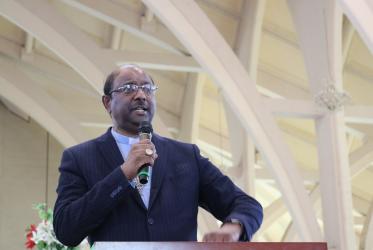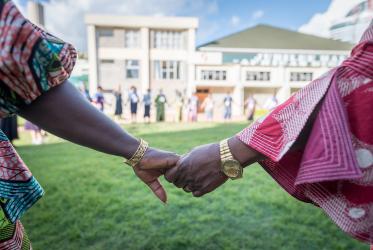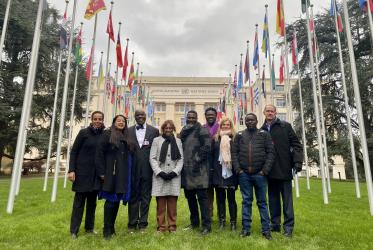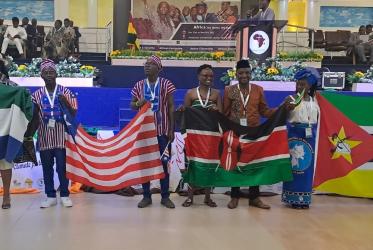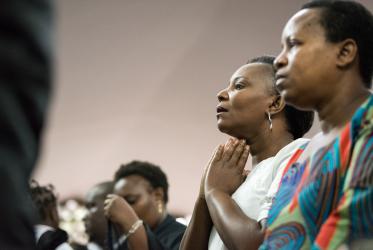1. Introduction
A delegation sent by the All Africa Conference of Churches and the World Council of Churches headed by His Excellency former President Joaquim Chissano of Mozambique arrived in Burundi on 29th January 2008 for a 3-day visit at the invitation of the National Council of Churches of Burundi.
2. Up date on the situation
Burundi has just completed 2 years under the rule of leaders democratically elected during the general elections held in 2005 and after which Burundians hoped that improvement will be a reality in promoting democratic values, consolidation of peace and security, management of the country and eradication of corruption.
On the contrary during the year 2007, insecurity and criminality increased and many people were killed, even if these killings were not systematic against a given group. Robberies with violence, rapes and violence against women multiplied.
The year 2007 was also a year of continuous instability of governing institutions at the national and local levels. The Government has been altered six times during the year.
Six local administrative entities experienced as well the same kind of instability.
The promise from the President to increase salaries of the Government staff with 34% , and some other decisions which were not implemented undermined the authority of the state.
It was also clear that the trust of some partners for the Government went decreasing because of serious cases of corruption.
The economic situation worsened and the management of the country was paralyzed by repetitive strikes of many civil servant including teachers at different levels.
3. The aim of the visit
President Chissano described the visit as an ecumenical visit to show solidarity with the people of Burundi. The delegation was bringing a message of love, peace, national unity, and fraternity. He said, "Our purpose is to encourage Burundians to find solutions to problems and to persist with dialogue at all levels."
The delegation met the President, the 2 Vice Presidents, Chairs of the Senate and the Parliament, as well as 4 former Presidents, Church leaders, the UN representative (BINUB), the Executive Secretary of the International Conference on the Great Lakes Region, and representatives of the civil society.
In a key-note speech to Church leaders President Chissano referred to the contribution of Mozambique to peace in Burundi and the work of advocacy undertaken through the initiatives of the Forum of Former Heads of State of Africa of which he is the current Chairman. He spoke about the role of the Church to create and sustain a climate of trust among all categories of people, including politicians.
He challenged the Church to apply its moral authority, to help build consensus, to engage with strengthening Burundi's institutions in order to analyse where reform is needed, and to encourage the Government of Burundi to create an atmosphere of confidence for every one.
Civic education was emphasized for creating a basis for the success of democracy that would ensure that citizens understood democratic processes and interpreted correctly the laws and norms of society.
It was acknowledged that the challenges are great : the climate of fear, insecurity and corruption, reintegration of former combatants, return and resettlement of refugees, human rights, poverty, disarmament, and a conclusion to negotiations between the Government and the FNL rebel movement. A proper answer to these issues would contribute immensely to the consolidation of peace in Burundi.
President Chissano called upon Burundians to resist temptations of all kinds that would return them to war.
A request was made to the WCC/AACC and the Forum of Former Heads of State of Africa to help the Church to be empowered for the work of reconciliation, capacity building and civic education.
The delegation gave assurance that the Churches of Burundi would receive support from the Ecumenical family.His Excellency President Chissano stated, "The churches from outside are willing to support you in the search for peace. We will be your advocates in the world but please help us to help you."
4. Conclusion
The model of Eminent persons visit has proved its relevance in Burundi, maybe because this first experience was led by a very respected person by both the Government and Church leaders. President Chissano communicated the ecumenical message for peace and reconciliation with love and clarity. During our concluding evaluation we shared the conviction that the formation of the former Heads of State's forum is a chance for the Eminent Persons Programme for Peace in Africa not only for intervening in situations of crisis but also for prevention of conflict and consolidation of peace and reconciliation in post-conflicts situation. The success of this experimental initiative was made possible by the determination of the churches in Burundi, the dedication and collaboration of all staff colleagues involved from AACC, FECCLAHA and WCC as well as the support from our Ecumenical Partners. With our deep gratitude to H. E. President Chissano for his outstanding leadership, to Rev. Dr. Mvume Dandale, the General Secretary of AACC for his accompaniment of the preparatory process and for members of the delegation.
Compiled by André Karamaga
WCC Executive Secretary for Africa

